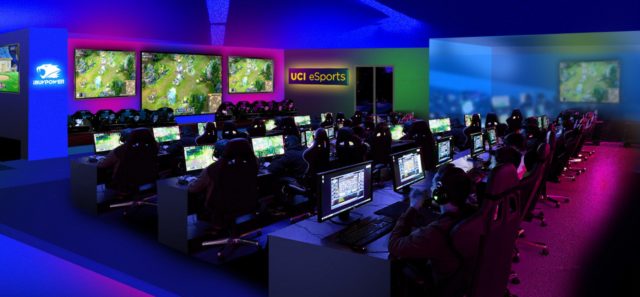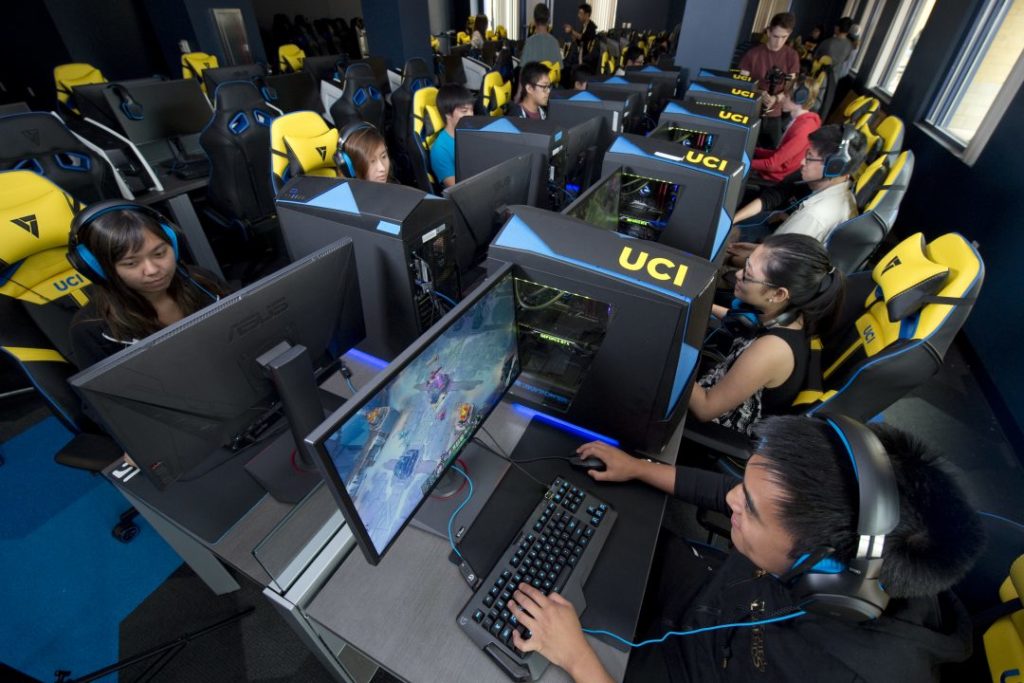Following the launch of their eSports scholarship program earlier this year, University of California, Irvine (UCI) has opened a dedicated eSports arena for the gaming community on campus. It’s the first eSports-focused facility at a public university in North America, and is by far the biggest school to date to make such a substantial investment in competitive gaming. The move has already attracted sponsors like iBUYPOWER, which has been a key endemic brand in eSports for years.
“We love the idea of collegiate gaming,” Tyrone Wang, eSports development manager at iBUYPOWER, told [a]listdaily. “We see eSports as a sport just like any other, one that requires dedication and discipline, and we believe players should be rewarded for their commitment with a path to higher education. We partnered with UCI because there were so many natural alignments, and quite frankly we wanted to be a part of something awesome.”
The company provided custom Intel-powered gaming PCs for the arena: the iBUYPOWER Revolt 2 and the iBUYPOWER Noctis 450. Having worked with different professional eSports organizations, Wang said the company understands their demanding needs. These are the same PCs—featuring Intel processors, Nvidia GTX 1080s and Asus gaming motherboards—that are used by ELeague and other eSports leagues.
“I truly believe collegiate eSports is the giant elephant in the room,” Wang said. “There are more gamers than there are traditional athletes. The level of interest and commitment shown by eSports players and students is simply at the point where they can no longer be ignored. The people are there, it is up to us, and the industry, to catch pace with the current generation of gamers.”
Mark Deppe, acting director of eSports at UCI, told [a]listdaily that sponsors like iBUYPOWER and Vertagear have been crucial to this program.

“We’ve pitched this program as a cost-neutral initiative for the university, and our sponsors have provided substantial financial and in-kind support,” Deppe said. “You’ll see sponsor logos around the arena and on team jerseys.”
Most of UCI’s early sponsors—and Deppe said more will be announced in the coming months—are endemic to the gaming industry. Currently celebrating its 50th anniversary, UCI has more than 30,000 students and offers 192 degree programs. Located in Orange County, it’s the region’s second-largest employer, contributing $4.8 billion annually to the local economy.
“We think we’re building the best collegiate eSports program in the world, and we think our brands will get exposure to tens of thousands of collegiate eSports fans this year,” Deppe said. “In the near future, I think the audience will grow into the millions.”
Private college Robert Morris University also launched its eSports program several years ago with endemic brands, but recently added Quest Nutrition to the mix.
“When we see non-endemics spending dollars on the demographic we hold so dearly, it makes a lot of our efforts feel validated in all the right ways,” Wang said. “We’re extremely thankful because when it comes down to it, non-endemics are explosive media machines that can bring exposure to a lot of decision-makers and movers in the industry.”
Deppe said out of the gate, Riot Games’ League of Legends is the focal point for its eSports arena.
“Our decision to focus on LoL was based on the larger fan base on campus and our club teams’ previous competitive success,” Deppe said. “In the early days of LoL, our teams won back-to-back-to-back national championships. LoL is also the most popular game in the world, so it was a natural choice for us. Moving forward, we’ll add additional games based on community interest and popularity.”
College eSports is just the latest audience iBUYPOWER is targeting. Wang said the biggest takeaway the company has learned about how to market is the value of authenticity.
“ESports fans will either be your greatest allies, or your strongest detractors,” Wang said. “They have been truly invaluable in finding raw feedback and understanding, therefore it’s helped us to understand the value of transparency.”
Wang has watched the eSports landscape evolve over the last few years from a fragmented, glorified hobby, where gaming enthusiasts gathered to discuss strategies and the highest levels of play, to a commercialized critical mass level where platforms like Twitch.tv serve as an online destination.
“The landscape has changed in that now the level of interest and sheer volume of traffic generate significant value from advertisers,” Wang said. “So the core passion is there, only now it can be ‘seen’ in the eyes of mainstream markets.”

